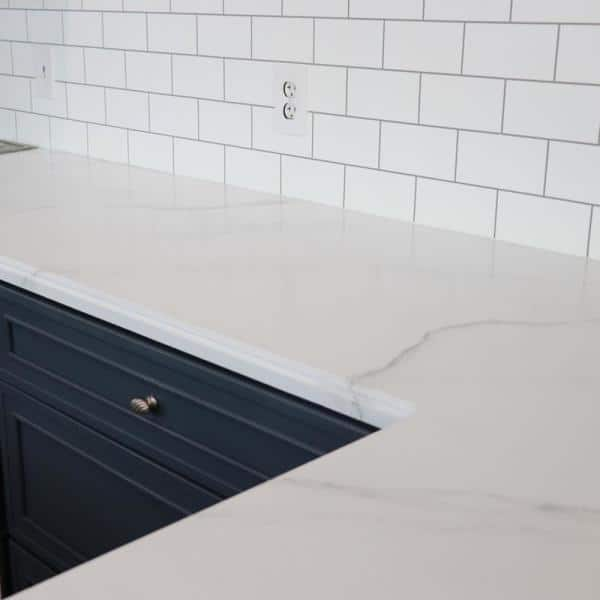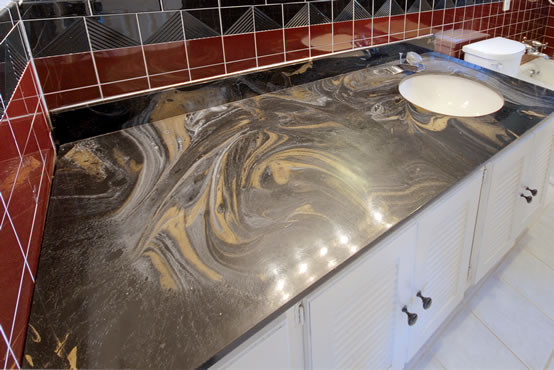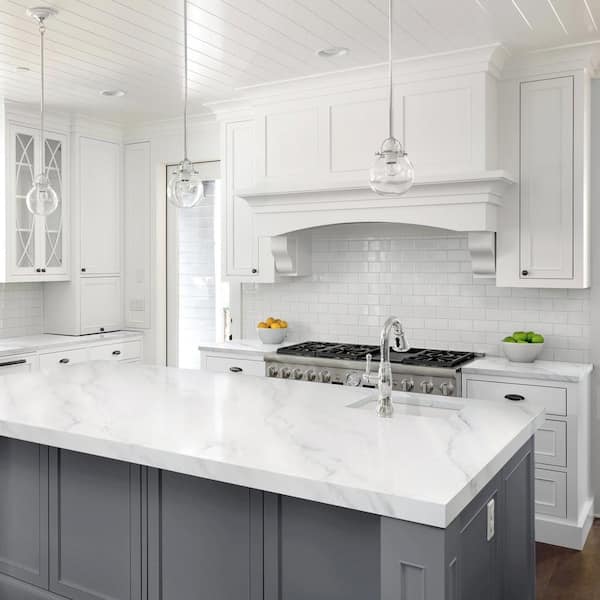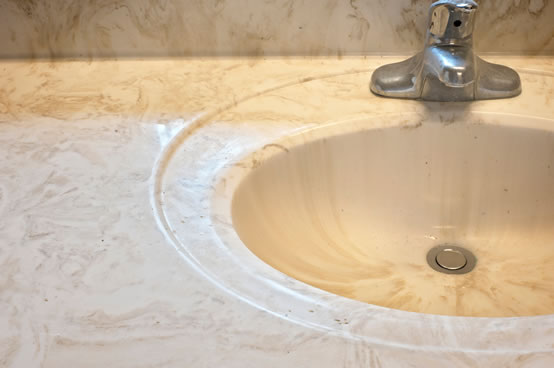Marble countertops bring a timeless elegance to any kitchen or bathroom, but over time, they can lose their luster due to wear and tear, spills, and exposure to various elements. Refinishing marble countertops can restore their original beauty and prolong their life, making it a worthwhile investment for homeowners who want to maintain the luxurious appeal of their surfaces. The process of refinishing marble countertops involves several steps, each requiring attention to detail and the right techniques to ensure a flawless finish.
The first step in refinishing marble countertops is cleaning the surface thoroughly. Marble is porous and can easily absorb stains and grime, which can make it appear dull and dirty. To clean the marble effectively, use a pH-neutral cleaner that is specifically designed for natural stone. Avoid harsh chemicals and acidic cleaners as they can damage the marble. Gently scrub the surface with a soft cloth or sponge, making sure to get into all the nooks and crannies. Rinse the countertop with clean water and dry it completely with a soft towel.
Once the marble is clean, the next step is to repair any chips, cracks, or scratches. Small chips and cracks can be filled with a marble repair kit, which usually contains a special adhesive or filler. For deeper scratches, you might need to use a marble polishing powder or compound. Apply the compound with a soft cloth or buffer, working in small circular motions until the scratch is no longer visible. It’s important to follow the manufacturer’s instructions carefully to avoid causing further damage.
Sanding is a crucial part of the refinishing process, as it helps to smooth out the surface and remove any remaining imperfections. Start with a coarse-grit sandpaper and work your way up to a finer grit, gradually smoothing out the surface. Use a hand sander or a sanding block, and make sure to keep the sandpaper wet to prevent dust and minimize scratching. Sanding should be done evenly across the entire surface to avoid creating uneven spots.

After sanding, the marble needs to be polished to restore its shine. Polishing can be done using a marble polishing powder or a polishing pad attached to a buffer. Apply the polishing compound to the surface and buff it in circular motions until the marble begins to shine. This step may need to be repeated several times to achieve the desired level of gloss. Be patient and take your time, as rushing through this process can result in an uneven finish.
Sealing the marble is the final step in the refinishing process. Sealing helps to protect the marble from future stains and damage by creating a barrier on the surface. Choose a high-quality marble sealer and apply it according to the manufacturer’s instructions. Usually, this involves spreading the sealer evenly across the surface with a clean cloth or sponge, allowing it to penetrate the marble, and then wiping off any excess. Allow the sealer to dry completely before using the countertop.
Maintaining refinished marble countertops requires regular cleaning and care. Avoid using abrasive cleaners or tools that can scratch the surface. Wipe up spills immediately to prevent staining, and use coasters and trivets to protect the marble from hot or acidic items. Regularly dust the countertops with a soft cloth to keep them looking their best. Additionally, it’s a good idea to reseal the marble every six to twelve months to maintain its protective barrier.

Refinishing marble countertops can be a DIY project if you have the right tools and are willing to invest the time and effort. However, if the damage is extensive or if you are unsure about any part of the process, it’s best to hire a professional. A professional stone restoration expert will have the experience and equipment necessary to achieve the best results and can often complete the job more quickly and efficiently than a DIY approach.
One of the benefits of refinishing marble countertops is that it can be more cost-effective than replacing them entirely. Marble is an expensive material, and replacing it can be a significant investment. Refinishing allows you to preserve the existing countertops while giving them a fresh, new look. This can be particularly beneficial if you are renovating your kitchen or bathroom on a budget.
In addition to being cost-effective, refinishing marble countertops is also an environmentally friendly option. By restoring the existing marble rather than replacing it, you reduce the amount of waste that ends up in landfills. This makes refinishing a sustainable choice for homeowners who are conscious of their environmental impact.
Refinishing marble countertops can also enhance the overall value of your home. Well-maintained, beautiful countertops can be a selling point for potential buyers, adding to the appeal and perceived value of your kitchen or bathroom. Even if you are not planning to sell your home in the near future, investing in the upkeep of your marble countertops can pay off in the long run.

While refinishing marble countertops can restore their appearance and protect them from future damage, it’s important to recognize the limitations of this process. Refinishing cannot always fix severe damage or deep stains that have penetrated the marble. In such cases, replacing the countertops might be the only viable option. Consulting with a professional can help you determine whether refinishing is the right choice for your specific situation.
Another consideration is the time and effort involved in refinishing marble countertops. The process can be labor-intensive and requires a certain level of skill and patience. If you are not comfortable with DIY projects or do not have the time to dedicate to the task, hiring a professional might be the better option. A professional can also provide advice on how to care for your refinished countertops to ensure they stay in great condition.
Overall, refinishing marble countertops is a practical and effective way to maintain their beauty and functionality. By following the proper steps and using the right products, you can achieve stunning results that will enhance the look of your home. Whether you choose to do it yourself or hire a professional, refinishing can breathe new life into your marble countertops and keep them looking their best for years to come.

Common Mistakes to Avoid
Refinishing marble countertops can be a rewarding project, but it’s important to avoid common mistakes that can compromise the results. One common mistake is using the wrong cleaning products. Harsh chemicals and acidic cleaners can damage the marble, so always opt for pH-neutral cleaners designed for natural stone. Another mistake is not repairing chips and cracks properly before sanding and polishing. Failing to address these issues can result in an uneven surface and poor finish.
Skipping the sanding process or not sanding evenly can also lead to problems. Sanding is essential for removing imperfections and creating a smooth surface, so take your time and work methodically. Additionally, using the wrong grit sandpaper can cause more harm than good. Start with a coarse grit and gradually move to finer grits to achieve the best results.
Another common mistake is not sealing the marble after refinishing. Sealing is crucial for protecting the marble from future stains and damage. Make sure to apply the sealer evenly and follow the manufacturer’s instructions for drying times. Finally, neglecting regular maintenance after refinishing can undo all your hard work. Clean your countertops regularly, avoid abrasive cleaners, and reseal them periodically to keep them in top condition.

How often should I refinish my marble countertops?
Marble countertops should generally be refinished every few years, depending on the level of wear and tear they experience. If your countertops are in high-traffic areas and frequently used, you might need to refinish them more often. Regular maintenance, such as cleaning and sealing, can extend the time between refinishing sessions.
Can I refinish marble countertops, or should I hire a professional?
While it is possible to refinish marble countertops yourself, it requires time, effort, and the right tools. If you are comfortable with DIY projects and have the necessary equipment, you can achieve good results. However, for extensive damage or if you are unsure about any part of the process, hiring a professional is recommended. Professionals have the experience and expertise to ensure a flawless finish.
What products should I use to clean my marble countertops before refinishing?
Use a pH-neutral cleaner designed for natural stone to clean your marble countertops. Avoid harsh chemicals and acidic cleaners, as they can damage the marble. Gently scrub the surface with a soft cloth or sponge, rinse with clean water, and dry completely with a soft towel. Regular cleaning with appropriate products will help maintain the marble’s appearance and prepare it for refinishing.
How can I prevent stains and damage to my refinished marble countertops?
To prevent stains and damage, wipe up spills immediately and avoid placing hot or acidic items on the marble surface. Use coasters, trivets, and cutting boards to protect the countertops. Regularly dust the countertops with a soft cloth and clean them with a pH-neutral cleaner. Resealing the marble every six to twelve months will also help protect it from stains and damage.
What are the benefits of refinishing marble countertops compared to replacing them?
Refinishing marble countertops is often more cost-effective than replacing them entirely. It allows you to preserve the existing marble while restoring its beauty and functionality. Refinishing is also an environmentally friendly option, as it reduces waste and the need for new materials. Additionally, well-maintained countertops can enhance the overall value of your home, making refinishing a worthwhile investment.
Marble Countertop Refinishing Polishing Massachusetts Rhode Island

Countertop Refinishing Kit
.jpg)
Restoring our Marble Counters

What is countertop resurfacing? TODAY.com

Cultured Marble Countertop Refinishing

Related articles:
- DIY Refinishing Cultured Marble Countertops
- Marble Countertops In Bathrooms
- Cultured Marble Countertops
- Gray Kitchen Cabinets Marble Countertops
- Modern Kitchen Marble Countertops
- Refinish Cultured Marble Countertop
- Carrara Marble Countertops Bathroom
- Marble Countertops Types
- How To Refinish Marble Countertops
- White Gray Marble Countertops